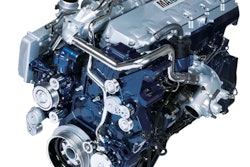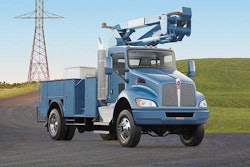Jerry McGuire isn’t the only one waiting for someone to show him the money.
Fleet managers considering the adaptation of natural gas are on the lookout, too.
Information abounds about how much cheaper natural gas is when compared to diesel. However, with the price of an alt-fuel truck far surpassing that of conventional tractors, concerns arise that upfront expense can offset long-term gains.
At an industry panel at the ACT Expo in Washington D.C. Thursday, several fleet executives who have successfully implemented natural gas in their operations shared their experiences, and how they’ve made it work.
Scott Perry, Vice President, Vehicle Supply Management for Ryder, says his company leaned heavily on the experiences of the refuse industry, where alternative fuels have increasingly become the norm.
“A lot of the lessons learned early on were built on experience from the refuse industry,” he says. “We learned a lot of technical lessons from Cummins ISL-G.”
Jeff Shefchik, President of Paper Transport, says his company also leaned on the refuse models, and the industry as a whole has benefited from the beta testing it provided.
“The refuse industry really led the way,” he says. “A lot of the dealerships have natural gas (technical) eexperience because there’s tens of thousands of refuse trucks out there running on natural gas.”
Among the technical lessons Perry’s team learned was the “silk glove treatment” natural gas engine components require.
“You have to ensure there’s no contamination of the components,” he says. “The days of grabbing a spark plug and threading it with dirty hands are gone. And torque values are very precise and important.”
Thanks to a roughly 80 percent component commonality with a diesel engine, Shefchik says there’s not been a steep learning curve on motor maintenance.
Perry says Ryder has worked with truck, engine and chassis OEs to develop training for its technicians but still has work ahead with one of the truck’s primary components.
“We’ve got a lot to learn from the tank OEMs,” he says. “It’s one of the biggest expenses on the truck, and it’s one that requires a new understanding.”
Perry says Ryder’s 170-truck natural gas fleet average 4,000 to 6,000 miles per month and has already logged 20 million miles.
While the cost of the truck can be significantly higher than its diesel counterpart, Perry said that’s not translated to a significant difference on the balance sheet.
“There’s little higher maintenance burden of about a 1.5 cents per mile more,” he says when compared to diesel.
Overall, Shefchik says his fleet’s conversion to CNG has lead to considerable savings – a diesel gallon equivalent cost of $2.33 compared to $3.93 to diesel at the pump.
“When your truck is using 15,000 to 20,000 gallons of fuel annually, even a 20 or 30 cent per gallon savings is a lot,” he says, adding that there is also a comfort in knowing the price of natural gas isn’t tied to crude oil and is much less volatile. “I can count on (price) to be very stable.”
As far as operating costs, Shefchik says a CNG unit can cost $185,000 on the lot compared to a $125,000 similarly spec’d diesel unit.
Shefchick estimated residual value of a truck at the end of its 7 year, 770,000 mile life cycle to be approximately $30,000 – that’s $10,000 higher than a diesel unit.
He estimates the truck to be worth $5,000 in scrap and the tanks to be worth $25,000 – an additional $5,000 more than an entire diesel unit with comparable age and miles.
Shefchik also estimated a fuel cost savings of .105 per mile when compared to diesel, even with CNG’s lower fuel economy (5.8 CNG compared to 7.5 diesel).
With a payback expectation of roughly four years, Shefnick says the value is there, citing a .607 cents cost per mile to operate a CNG truck compared to diesel’s .637 cents.
Mike Lickert, Corporate Fleet Manager, Giant Eagle, says his math wasn’t far behind.
“To run a diesel truck one mile in our industry today is 60-66 cents per mile,” he says. “After 500,000 miles, fuel costs are $315,000 in diesel fuel. With CNG, that’s about $210,000.”
Even factoring in the higher cost of the truck, Lickert says it’s hard not to come out financially ahead with a properly utilized and correctly spec’d natural gas truck.
“With the cost of the truck, maintenance, fuel, all that…Your net cost is going to be about $315,000 for the diesel truck. It will be about $250,000 with CNG. And performance is on par with diesel.”











